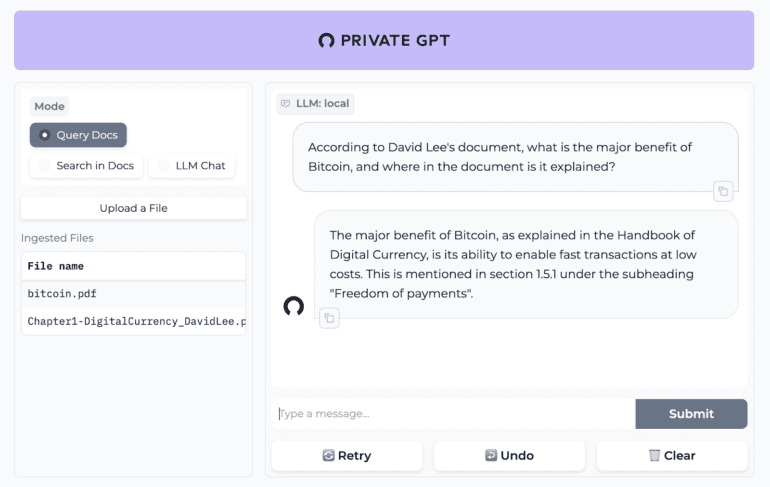- Industries like healthcare and legal sectors struggle with data privacy while adopting AI.
- PrivateGPT offers an offline AI service, ensuring data remains local and secure.
- It provides document ingestion and response generation features.
- The focus on privacy and security distinguishes PrivateGPT from other AI services.
Main AI News:
In today’s data-driven landscape, maintaining confidentiality while harnessing the power of cutting-edge technology poses a significant challenge. Industries handling sensitive information, including healthcare and legal sectors, are particularly wary of adopting new technological tools due to concerns regarding data privacy and security. The hesitation often stems from the reliance on third-party artificial intelligence (AI) services, which entail the transmission of data over the internet, thereby risking potential breaches of confidentiality.
Despite these challenges, solutions exist that enable organizations to leverage AI capabilities while safeguarding data privacy. These solutions encompass AI tools that ensure data security or the development of intricate, bespoke systems that operate independently of external services. However, these approaches may be constrained in efficacy, complex to implement, or still susceptible to data exposure risks, leaving many organizations seeking a more robust and private means of harnessing AI’s potential.
Enter PrivateGPT: a fully offline, localized AI service tailored to address these concerns. This innovative solution enables users to interact with large language models (LLMs) akin to popular AI chatbots, with a critical distinction: all data processing occurs exclusively on the user’s device or designated server. By eliminating the need for internet connectivity and ensuring that data never traverses beyond the local environment, PrivateGPT offers a compelling solution for entities seeking heightened confidence in the protection of their sensitive information.
Beyond its conceptualization, PrivateGPT stands as a functional tool equipped with remarkable capabilities. Its feature set includes document ingestion functionality, facilitating the intake, comprehension, and secure storage of textual data within the local environment. Additionally, the service enables the generation of responses and completion of texts based on user inputs, mirroring the functionalities of its internet-dependent counterparts. However, what truly sets PrivateGPT apart is its unwavering commitment to privacy and security, guaranteeing that all AI interactions remain confined within the user’s chosen environment, thereby instilling confidence in the integrity of data processing operations.
Conclusion:
PrivateGPT’s innovative approach to AI document processing addresses pressing concerns regarding data privacy and security. Offering a fully offline solution meets the needs of industries handling sensitive information. This signifies a significant step forward in the market, providing organizations with a reliable option for leveraging AI capabilities while safeguarding their data.

